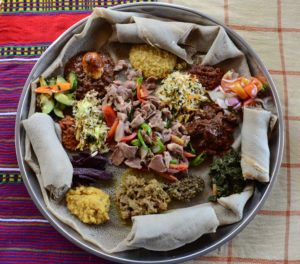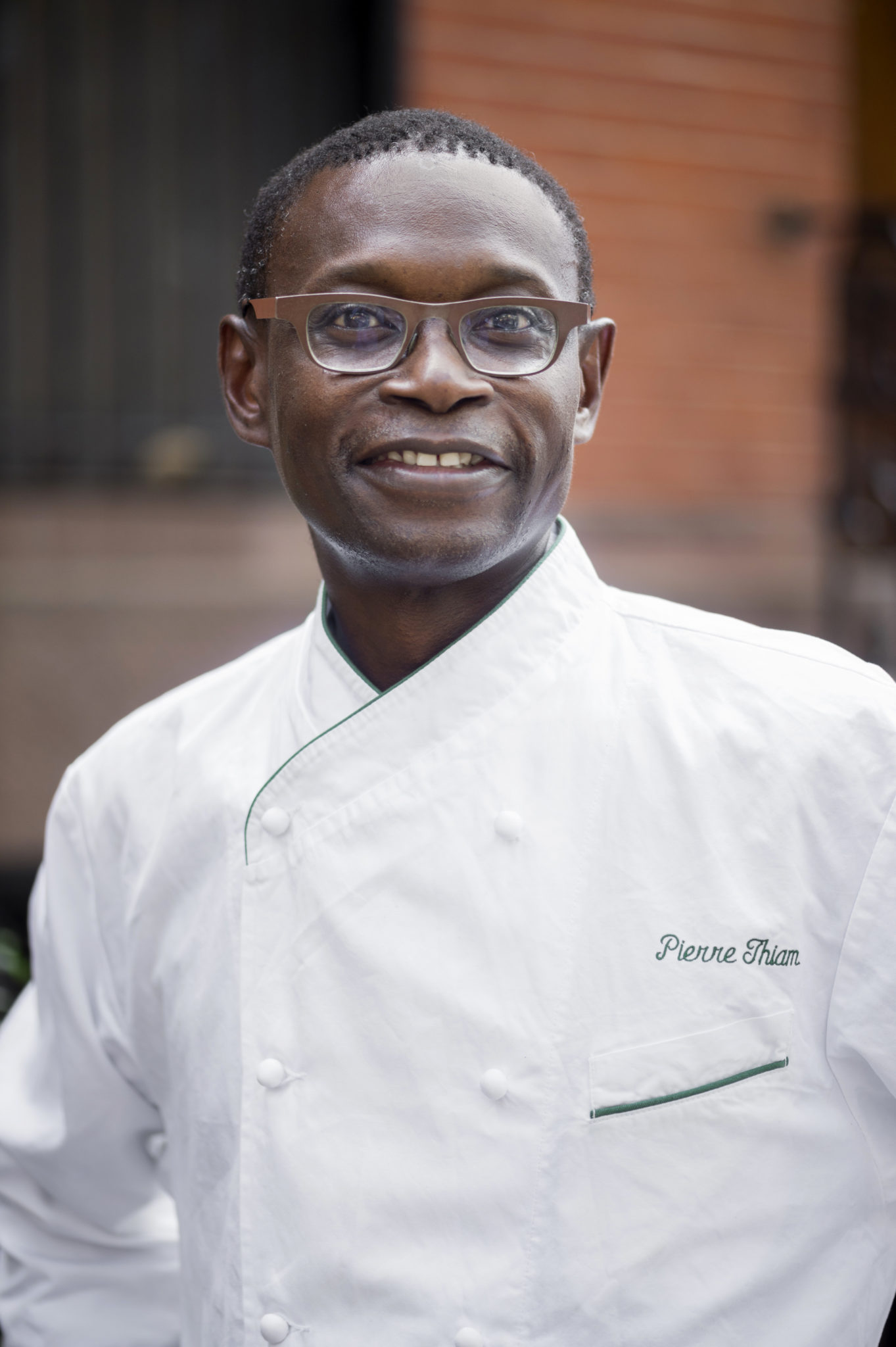African food entrepreneurs need government support to protect the value of their heritage products
When it comes to international food fashion, Africa is the new Asia. So, say über-influential, absurdly chic London food design studio Bompas & Parr. Their 2018 report, The Imminent Future of Food, predicts that internationally the “obsession with food from Asian countries will dwindle in favour of African cuisine because (Africa) is arguably the main remaining world food culture left to be adopted, adapted and commercialised.
“Bompas & Parr has already worked on African-focused projects for European commercial clients which reveal starkly different flavours, consumer expectations and notions of hospitality,” the report continues. “At our bar, Alcoholic Architecture, we also hosted sell-out special events incorporating Ghanaian bitters in cocktails, revealing a profound curiosity on the part of consumers for new tastes and flavours. This is just the start.”

Traditional Ethiopian dish consisting of a meat, vegetables, grains, rice and served with pancake-like injera.
The continent is also suddenly super-food central, with the worldwide wellness blogger brigade ditching last year’s chia seeds and turmeric in favour of African indigenous ingredients such as baobab and marula. Confusingly, the American actress Gwyneth Paltrow, who runs lifestyle brand and website Goop, has recently referred to both sorghum and fonio as “the new quinoa”. Since both are gluten-free, low GI, African ancient grains it is all much of a muchness as regards nutritional value – though both taste significantly better than South American quinoa.
The hipster health nuts and the foodie fashionistas aren’t wrong to recognise value in African cuisines. They offer a plethora of fine flavours, from the aromatic cumin and cinnamon infused lamb tagines of Morocco to the generous peanut and ginger joys of Ghanaian hkatenkwan chicken and on into the comforting floral flavours of a Congolese cassava kwanga bread. Interesting ingredients abound, including the rich, soured splendours of South African amasi curds and the berbere-spiced grace of an Ethiopian wot pot.
What is unsavoury is the implication that the continent’s deliciously diverse time-honoured epicurean expressions of identity exist to be “adopted, adapted and commercialised” as transient novelties in northern cosmopoles. Try adopting, adapting and commercialising a regional French food without so much as a by your leave! You’ll quickly find yourself slapped with a geographical denomination suit.
Tangible and intangible benefits can and should accrue to all sectors of African society by way of the continent’s “new Asia” status. But it is also possible that the trend will become yet another round of cultural appropriation, bio-prospecting and/or piracy. To prevent such a situation, African food entrepreneurs are attempting to take the lead in curating the commercialisation of their continent’s cuisine at home and abroad.
Turning food culture into economic value for Africans is especially important given that the Food and Agricultural Organisation reported that in 2017 there were 224 million under-nourished people in sub-Saharan Africa. On this score alone it would be morally repugnant if the fashion for African food further exploited and impoverished the continent’s culinary cultures.
Currently, the global fine-dining world is focusing on heritage flavours reimagined to delight modern palates. This trend is as true in the New Nordic cuisine of René Redzepi, chef-patron of two-Michelin star Noma in Copenhagen, Denmark, as it is in the work of Pierre Thiam, executive chef of the contemporary African restaurant Nok by Alara in Lagos, Nigeria.
Nok, located within a bespoke building designed by Ghanaian-British architectural superstar David Adjaye, serves a signature starter of ofada rice balls sauced with egusi (wild gourd seed pesto) and ndole (bitter, leaf salsa). At Epicure – Johannesburg’s culinary kingdom of Afro-optimistic elegance – Burundian-born chef/patron Coco Reinarhz engages in an exquisite ancient-to-modern culinary dialogue that includes a plate of fried plantain aloko topped with a swirl of tuile biscuit and a quenelle of ruby bissap rouge (hibiscus) sorbet.
This style of cooking often requires relatively rare traditional ingredients and indigenous knowledge. Chefs often have to seek out and commission such crops from relatively isolated, traditional subsistence farming and foraging communities, many of whom exist on the fringe of the cash economy. In so doing, they create and maintain profitable markets for otherwise endangered heritage foods, and go some way to promoting biodiversity and supporting indigenous agricultural and culinary knowledge.
This is as true for Brazilian Chef Alex Atala, who uses Amazonian ingredients at DOM, his Sāo Paulo restaurant; Atala won the Chef’s Choice award at the 2014 S.Pellegrino World’s 50 Best Restaurants in 2014. It’s also true of Paternoster, where South African chef Kobus Van der Merwe creates perfect plates, such as maasbanker bokkom and pear salad with ice plant, dune spinach and sea lettuce tossed in pickled ginger, celery and almonds.

Executive Chef Pierre Thiam. Photo: supplied
Ivorian entrepreneur Swaady Martin, CEO of Yswara fine African tea, describes her business model as “luxe ubuntu”. A recent winner of a Brand Africa award, she processes and blends African heritage ingredients sourced from fair-trade growers, using equipment commissioned and manufactured in Africa. She says, “luxe ubuntu describes the concept of an inclusive luxury business model in which all the members of a supply chain are beneficiaries of the economic value generated. We are committed to reversing the commodity trap by keeping the value add in Africa.”
Martin, who opened her flagship store at the Cosmopolitan Building in Maboneng, Johannesburg in September 2017, has concluded deals with Selfridges in the UK and Galeries Lafayette in France. Such international links not only provide tangible benefits of export earnings and profit repatriation, but also play a role in distancing Africa from hitherto commonplace negative stereotypes by encouraging desirable associations with elegant, world-class wonderful artisan offerings.
Some government interest and assistance could further promote such image improvements. In Peru, government promotion of regionally specific, high-end heritage cuisine, and the restaurants that serve it, brought significant economic benefits. Until recently, for instance, tourists commonly considered Lima to be a kidnap risk and begrudged the stopover on the way to Machu Picchu. It is now a “must-visit” food experience destination, with five restaurants in the top 50 of the S. Pellegrino World’s Best Restaurants list. Similarly, the Mexican government has promoted the country as a culinary destination and inscribed Aztec food culture in the UNESCO-administered list of Intangible Cultural Heritage.
How is it that the government of Mozambique has not applied for piri piri to be classified as such? This classic southern African sauce/seasoning is increasingly popular worldwide with an appreciative audience – most of whom have no notion that their favourite flavour originates in the Afro-Lusitanian fusion food culture of Maputo. Meanwhile, the “peri peri” (sic) potato chips sold all over the US are an inferior interpretation that undermines the value of authentic piri piri and may limit the long-term potential for Mozambican food entrepreneurs to create a food tourism industry around their fiery birthright.

Burundian-born Coco Reinarhz, chef/patron of Epicure in Johannesburg. Photo: Clinton Nortje
Real Mozambican piri piri is made from an African Landrace chilli, according to a regionally specific recipe. It would, therefore, be an ideal candidate for an international Geographical Indicator (GI), which would protect the value that resides within such heritage. Currently, the European Union (EU) has registered more than 837 GI-recognised products, including Cheddar cheese, Parma ham and Rioja wine. Following World Trade Organisation (WTO) dispute resolution proceedings, the EU was forced to amend its GI legislation to recognise third-country GIs.
It is now possible for producers from non-European countries to register GIs under EU Regulation 510/2006, provided the GI is protected in its country of origin. Colombian coffee was the first product from a developing country to be granted such GI by the EU. With Europe being a major export market for many developing world products, this law affords producers a valuable opportunity to protect their GIs throughout the EU member countries by submitting a single application.
GI applications under the EU system require detailed documentation on the product’s specificity and link with the territory. To date, the only African products registered with the EU GI are Rooibos, Honey bush, Karoo lamb and Essourian argan oil. Yet African governments neglect to protect foodstuffs in their own jurisdictions, while they hamper food entrepreneurs’ ability to put a premium value on their intangible cultural heritage at export.
The world is waking up to the beauty of African cuisines. Recognition is all well and good. A share in the tangible and intangible value of such food cultures for the people from whence they come would be better. A culinary coalition is required to make this a reality.
African restaurateurs and other food producers are increasingly creating partnerships, upstream with suppliers and downstream with end users. What they lack is sufficient governmental support and respect. A trend is transient. African epicurean entrepreneurs must campaign for a permanent seat at the table of great world food cultures. As we saw earlier, this would be just the start.
Dr Anna Trapido is an anthropologist and a chef. She trained as an anthropologist at King’s College, Cambridge, completing her PhD in the department of community health at Wits University, Johannesburg. She qualified as a chef at the Prue Leith Chef’s Academy in Pretoria, and uses both disciplines in her work. She has won gold at the World Gourmand Cookbook Awards three times (for To the Banqueting House - African cuisine an Epic Journey, Hunger for Freedom – the story of food in the life of Nelson Mandela, and Eat Ting – lose weight, gain health, find yourself).














